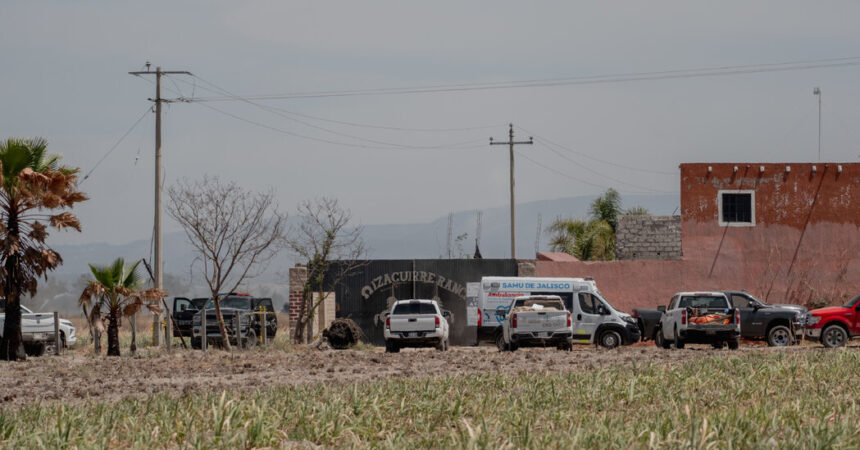The mayor of a small Mexican city has been accused of colliding with one of the most violent drug cartels in the country to operate a recruitment and training center that was discovered in March.
The mayor, José Asunció, Murguía Santiago, was accused of crimes of organized crimes and forced disappearance, Prosecutors said at a hearing on Friday.
The site of the center, in the western state of Jalisco, gained notoriety after volunteer search engines announced the discovery of hungry shoes stacked, lots of clothing and what seemed to be fragments of human bones in Berlawnn sugar, city outside Guadalajara, sending shock waves through the nation. The search engines said that the ranch was the site of human cremations, but since then the authorities have said that there is no evidence of that.
The accusations against Mr. Murguía Santiago served as a sharp reminder or the long collusion history of Mexican officials with organized crime, at a time when President Trump proposed to use US troops to take strong measures in the posters. The president of Mexico refused.
Attorney General Alejandro Gertz said last week that until recently the ranch in Teuchitlán had been the Jalisco New Generation poster for training and recruitment. Mexican officials have said that the poster attracted new recruits with false work sacrifices to the ranch.
But in a deviation from the previous comments, Mr. Gertz insisted that there was no proof of cremations carried out there, and said he states that the site had a “extermination field” that was unfounded. Volunteer groups have played federal findings, insisting that 17 lots of carled human remains, including teeth and bone fragments, have recovered from the ranch.
Mr. Gertz said his office did not know how many people could have disappeared in the ranch and that the researchers “persecute those who were covering or participating in the poster operations.
The case has drawn renewed attention to the more than 127,000 people who have disappeared in Mexico since the 1960s. It has also become a thorn on the administration side of President Claudia Sheinbaum of Mexico, who is under pressure to resolve the country’s disappearance crisis once and for all. Since he assumed the position in October, almost 8,700 people have disappeared, according to government data.
While Mrs. Sheinbaum has promised to use her strength to counteract the posters, and has intensified those efforts since Trump came to power: the link between Mexican authorities and drug groups remains a problem.
Until now, more than one suspicious boxes have arrested in the bone in relation to the case of Tuchitlán. They include four former police officers and a police officers, as well as a sign of the poster identified as José Gregorio Lastra, to whom the authorities, according to the authorities, supervised the training center.
According to Mr. Lastra’s testimony, revealed in part by Mexican officials, his group would kill, hit and torture people who resisted training or tried to escape the ranch.
Mr. Murguía Santiago, now in his third term in office, is the first government official who has been arrested. His judgment on May 3, according to experts, points out the very close relationship that organized crime has been established with local authorities in some parts of Mexico, either through collaboration or coercion.
“Or you try to stop the territorial progress of organized crime, and you pay a lot for that,” said David Mora, senior analyst of the International Crisis Group, an organization that monitors and tries to mitigate armed conflicts, “or you bend and cooperation.”
The details of the case against the mayor came out at a Friday audience.
According to prosecutors, they allegedly visited the ranch several times in 2024. Prosecutors are also aggression to Mr. Murguía Santiago or are on the payroll of the poster. In return, they say, the mayor allowed them to operate the training center and offered surveillance through the Municipal Police to ensure that recruits do not escape.
“How is it possible that the person who is supposed to take care of us is part of this criminal organization?” Víctor Manuel Guajardo said, one of the federal prosecutors who supervises the case, duration of the hearing on Friday. “Hello, it allowed this criminal group to develop and grow.”
Mr. Murguía Santiago has so far refused to testify. During the hearing, his dependency team brought a witness, his secretary, who said that the mayor could not have visited the ranch in the months he is accused of having been there because he was with him “most of the time time of the program said.
In March, Mr. Murguía Santiago told journalists that he had no knowledge of what was happening at the ranch.
“I’m not worried,” he said in a televised interview. “We are not involved in anything. What I have always tried to do as mayor is to help people.”
Since he assumed the position in January, the Trump administration accused the Mexican government of being controlled by the posters, which suggests that US forces are necessary to counteract their fixed drug and smuggling empire. That has led to episodes of tension with the Mexican government, which insists that a unilateral attack of the Pentagon against the posters would be a violation of the sovereignty of Mexico and establish bilateral relations for decades.
Carolina Solís Reports contributed by El Salto, Jalisco.








